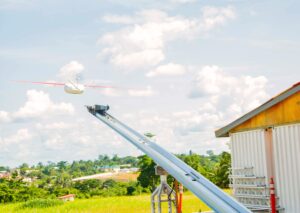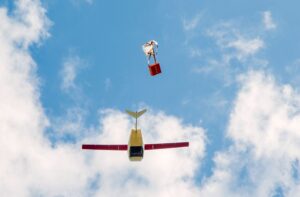A recent collaboration between Jumia Group and Zipline Technologies in Ghana and logistics companies leverage innovation using drones and automated aircraft.
Ghana flights a tech future, African drone delivery goes “mainstream”

A collaboration between an award-winning e-retailer and a drone company is already delivering household goods in one African country, with more rollouts – including in one of Africa’s “giants” – to come.
A recent collaboration between Jumia Group and Zipline Technologies in Ghana and logistics companies leverage innovation using drones and automated aircraft.
Bonface Orucho, bird story agency
After six months of delivery trials by drone, covering about 2500 kilometres Zipline Technologies and Jumia Group announced a partnership on September 2, heralding a “new dawn” for retailing in Africa as on-demand delivery to rural areas edged closer to reality,
According to Daniel Blay of Zipline Africa, while the company has been operating on the continent since 2016, when it rolled out operations in Rwanda to deliver medical products, this is its first foray into the “mainstream” world of retailing.
“The partnership with Jumia in Ghana is the first in the private sector and second in Africa after Rwanda. It is an advancement even for us as Zipline because we will get to deliver beyond human and animal health products that we are known to capitalize on, considering we are now delivering consumer products ranging from cosmetics, electronics, and general supplies,” Blay told bird story agency.
While Zipline and Jumia are planning to roll out operations further, to neighbouring Nigeria and Cote d’Ivoire, the first phase sees delivery coverage rolled out from a base in Omenako, some 70km north of Accra.
A collaboration between an award-winning e-retailer and a drone company is already delivering household goods in one African country, with more rollouts – including in one of Africa’s “giants” – to come.
“In this first phase, we have set up six distribution centres stretching as far as 85 kilometres from Omenako, the central operations and controls centre. When products get to the distribution centres they are then be ferried to owners who are close by road transport,” he added.
Zipline foresees more partnerships across the continent, with active plans to set up operations in East, North and South Africa.
In Kenya, Zipline already has an active MOU with four counties from the Lake Region Economic Bloc to share and access human medical supplies to actualize Universal Health Coverage.
“We have, in fact, done aircraft and drone tests in Kisumu which we intend to be our centre point and we are only waiting for a few clearances and commitments before we advance,” noted Zipline’s Africa Senior Vice-President, Daniel Marfo.
“Other than Jumia, we intend to work with SMEs but everything depends on critical factors such as government openness and regulatory requirements. If these are checked, then it becomes easier to operate,” Marfo added.
The disruptive shift to innovative logistics is a strategic move by Jumia, which envisions a better experience in service delivery.
According to Apoorva Kumar, group COO and director of Jumia’s supply chain management, using drone technology will not only speed up delivery times but will also include direct deliveries.
“In our second phase, we intend to actually make direct deliveries to the customers and it will definitely be interesting for the customer to receive their package at their yard via a drone,” he explained.
While the operation offers savings on time, it is also a climate-friendly delivery option.
“More fundamentally, all these are indicators of our commitment to sustainability and reduced emissions while offering our customers options and delivery alternatives,” he explained.
According to Apoorva, while the drone technology is complementary to the company’s existing delivery systems and logistical protocols (primarily by road) results from Rwanda and the pilot program in Ghana before rollout indicate that the technology can be very supportive to e-retailing in Africa.
“We will definitely penetrate deeper into households and reach customers who we would otherwise not have reached because of the physical limitations such as due to geographical factors and limited infrastructure,” Apoorva noted.


“The bottom line is that we anticipate the new technology to boost our retailing quality, allow us to reach a higher customer base and help us save on some costs because the heavy packaging used when transporting by road will not be necessary,” he added.
Jumia is seeking to venture into new markets and cover more countries across the 11 markets in Africa, a plan that Apoorva is highly optimistic will be realised.
Africa technology development analysts point to a growing revolutionary spirit of tech entrepreneurism across the continent, with innovators increasingly comfortable turning to technological innovation to solve problems and improve lives.
According to Daniel Muteti, a technology trends expert, Africa has registered considerable progress in both adopting and integrating technological solutions for what are often unique challenges.
“In Rwanda’s case, the government took a lead role in providing a favourable environment for a company such as Zipline to set up product distribution centres an attribute that is missing in some countries,” he explained.
According to Muteti, lack of political goodwill and low adaptability at the legislative and bureaucratic level are to blame for the difficulties that tech companies and innovators face.
“Gauging from the internet penetration rates and access to smartphones, there is no doubt many countries across the continent are doing quite well but there is more that can be done to ensure there is the optimization of technological benefits and returns,” he noted.
He also called for increases in budgetary allocations from governments to improve the required infrastructure and streamline existing policies to favour such technology.
“For instance, before drone delivery technology can be incorporated into a country, some essential infrastructure and clearances will be required. This will be difficult to achieve if the policies and the budgets are not favouring such a project,” he added.
Muteti is optimistic that the continent will thrive with more cross-country partnership and collaboration between both the private sector and government, which will significantly reduce the cost of deploying new technology.
Logistics companies operating in Africa have from as early as 2018 shown interest in deploying drone technology.
In 2018, German-based DHL Express Company undertook a pilot program in which they deployed drone technology to supply medical supplies in Tanzania between Ukerewe Island in Lake Victoria and the mainland. However, the program did not launch officially, making Zipline and Jumia’s retail delivery solution the first to be actualized on the continent.
“This technology is definitely something to watch out for in future, especially considering the big economies in the continent are yet to deploy it – meaning they might as well get out there and deploy it which will elevate the logistics status of the continent entirely,” Muteti said.
bird story agency




